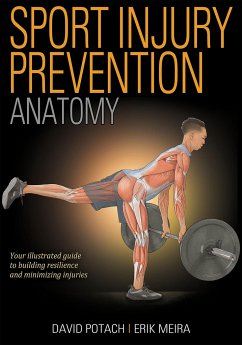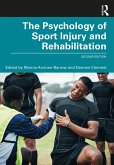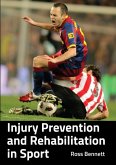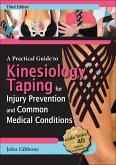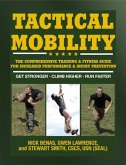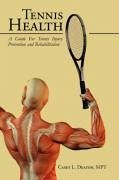- Broschiertes Buch
- Merkliste
- Auf die Merkliste
- Bewerten Bewerten
- Teilen
- Produkt teilen
- Produkterinnerung
- Produkterinnerung
Sport Injury Prevention Anatomy provides an in-depth look at common athletic injuries and the best exercises and training protocols to reduce their occurrence. With the latest research, expert analysis, detailed anatomical illustrations, and programming advice, it is the definitive guide for understanding and preventing sport injuries.
Andere Kunden interessierten sich auch für
![Run Healthy: The Runner's Guide to Injury Prevention and Treatment Run Healthy: The Runner's Guide to Injury Prevention and Treatment]() Emmi AguillardRun Healthy: The Runner's Guide to Injury Prevention and Treatment23,99 €
Emmi AguillardRun Healthy: The Runner's Guide to Injury Prevention and Treatment23,99 €![Lucky Lucky]() Ed JacksonLucky24,99 €
Ed JacksonLucky24,99 €![The Psychology of Sport Injury and Rehabilitation The Psychology of Sport Injury and Rehabilitation]() The Psychology of Sport Injury and Rehabilitation35,99 €
The Psychology of Sport Injury and Rehabilitation35,99 €![Injury Prevention and Rehabilitation in Sport Injury Prevention and Rehabilitation in Sport]() Ross BennettInjury Prevention and Rehabilitation in Sport19,99 €
Ross BennettInjury Prevention and Rehabilitation in Sport19,99 €![A Practical Guide to Kinesiology Taping for Injury Prevention and Common Medical Conditions A Practical Guide to Kinesiology Taping for Injury Prevention and Common Medical Conditions]() John GibbonsA Practical Guide to Kinesiology Taping for Injury Prevention and Common Medical Conditions21,99 €
John GibbonsA Practical Guide to Kinesiology Taping for Injury Prevention and Common Medical Conditions21,99 €![Tactical Mobility: The Comprehensive Training & Fitness Guide for Increased Performance & Injury Prevention Tactical Mobility: The Comprehensive Training & Fitness Guide for Increased Performance & Injury Prevention]() Nick BenasTactical Mobility: The Comprehensive Training & Fitness Guide for Increased Performance & Injury Prevention17,99 €
Nick BenasTactical Mobility: The Comprehensive Training & Fitness Guide for Increased Performance & Injury Prevention17,99 €![Tennis Health: A Guide For Tennis Injury Prevention and Rehabilitation Tennis Health: A Guide For Tennis Injury Prevention and Rehabilitation]() Casey L. DeatonTennis Health: A Guide For Tennis Injury Prevention and Rehabilitation17,99 €
Casey L. DeatonTennis Health: A Guide For Tennis Injury Prevention and Rehabilitation17,99 €-
-
-
Sport Injury Prevention Anatomy provides an in-depth look at common athletic injuries and the best exercises and training protocols to reduce their occurrence. With the latest research, expert analysis, detailed anatomical illustrations, and programming advice, it is the definitive guide for understanding and preventing sport injuries.
Produktdetails
- Produktdetails
- Verlag: Human Kinetics Publishers
- Seitenzahl: 232
- Erscheinungstermin: 15. Juni 2022
- Englisch
- Abmessung: 252mm x 181mm x 15mm
- Gewicht: 560g
- ISBN-13: 9781718208285
- ISBN-10: 1718208286
- Artikelnr.: 63238211
- Verlag: Human Kinetics Publishers
- Seitenzahl: 232
- Erscheinungstermin: 15. Juni 2022
- Englisch
- Abmessung: 252mm x 181mm x 15mm
- Gewicht: 560g
- ISBN-13: 9781718208285
- ISBN-10: 1718208286
- Artikelnr.: 63238211
David Potach, PT, SCS, CSCS, is the director of rehabilitation at Cheshire Medical Center in Keene, New Hampshire. In addition, he is the founder of the Injury Prevention Project, a nonprofit organization focused on providing low-cost injury prevention programming to athletes. He has been helping athletes reach their performance goals for over 30 years and has a passion for incorporating strength training and plyometric principles in rehabilitation settings and using those principles as a tool to reduce the risk of injury in sport. Potach previously served as a strength and conditioning coach at Creighton University, owned Omaha Sports Physical Therapy, and was director of sports rehab at Children's Hospital and Medical Center. Potach has spoken internationally and regionally on strength training and conditioning, plyometrics, injury prevention, and sports rehabilitation. He has authored several articles on sports rehabilitation as well as textbook chapters on sports medicine and sports conditioning. In 2005, he became one of the first recipients to be awarded the National Strength and Conditioning Association (NSCA) Sports Medicine Professional of the Year award. He is an ABPTS board-certified Sports Clinical Specialist and is recognized by the NSCA as a Certified Strength and Conditioning Specialist (CSCS). He was the cofounder of the NSCA's Sports Medicine Special Interest Group, was a longtime member of the NSCA's CSCS Exam Development Committee, and was a member of the ABPTS Sports Specialization Academy of Content Experts. He holds master of physical therapy and master of science degrees—both from the University of Nebraska—and a bachelor of arts degree in exercise science from Creighton University. Erik P. Meira, PT, DPT, is currently the director of Physical Therapy Science Communication Group, a company based out of Portland, Oregon, that specializes in sports rehabilitation and education. He is also a clinical advisor to the University of Portland NCAA Division I program. He is an ABPTS board-certified Sports Clinical Specialist and is recognized by the NSCA as a Certified Strength and Conditioning Specialist (CSCS) with extensive experience in the management of sport injuries at many different levels. He is a frequent consultant for organizations within the NCAA, NBA, NFL, MLS, WNSL, and other elite sports leagues. Dr. Meira has authored several articles and textbook chapters, and he lectures internationally, in settings that range from speaking to small teams in private settings to being the keynote speaker at large professional conferences. Known for his ability to make complex ideas simple to understand with a humorous delivery style, he covers topics such as hips, knees, exercise prescription, returning athletes to sport, science application, applied biomechanics, and physical therapy practice models. He was the founder and the original chair of the Hip Special Interest Group of the American Academy of Sports Physical Therapy (AASPT), served as their APTA Combined Sections Meeting (CSM) program chair, and was a member of the AASPT Executive Committee. He is also the cohost of PT Inquest, a podcast dedicated to understanding physical therapy science, and provides continuing education through The Science PT.
Chapter 1. Understanding Sport Injuries
Chapter 2. Injury Prevention Exercise Principles
Chapter 3. Head, Neck, and Shoulders
Chapter 4. Elbows, Wrists, and Hands
Chapter 5. Spine and Trunk
Chapter 6. Hips
Chapter 7. Thighs
Chapter 8. Knees
Chapter 9. Legs, Ankles, and Feet
Chapter 10. Warm-Up for Injury Prevention
Chapter 11. Injury Prevention Program Design
Chapter 2. Injury Prevention Exercise Principles
Chapter 3. Head, Neck, and Shoulders
Chapter 4. Elbows, Wrists, and Hands
Chapter 5. Spine and Trunk
Chapter 6. Hips
Chapter 7. Thighs
Chapter 8. Knees
Chapter 9. Legs, Ankles, and Feet
Chapter 10. Warm-Up for Injury Prevention
Chapter 11. Injury Prevention Program Design
Chapter 1. Understanding Sport Injuries
Chapter 2. Injury Prevention Exercise Principles
Chapter 3. Head, Neck, and Shoulders
Chapter 4. Elbows, Wrists, and Hands
Chapter 5. Spine and Trunk
Chapter 6. Hips
Chapter 7. Thighs
Chapter 8. Knees
Chapter 9. Legs, Ankles, and Feet
Chapter 10. Warm-Up for Injury Prevention
Chapter 11. Injury Prevention Program Design
Chapter 2. Injury Prevention Exercise Principles
Chapter 3. Head, Neck, and Shoulders
Chapter 4. Elbows, Wrists, and Hands
Chapter 5. Spine and Trunk
Chapter 6. Hips
Chapter 7. Thighs
Chapter 8. Knees
Chapter 9. Legs, Ankles, and Feet
Chapter 10. Warm-Up for Injury Prevention
Chapter 11. Injury Prevention Program Design

